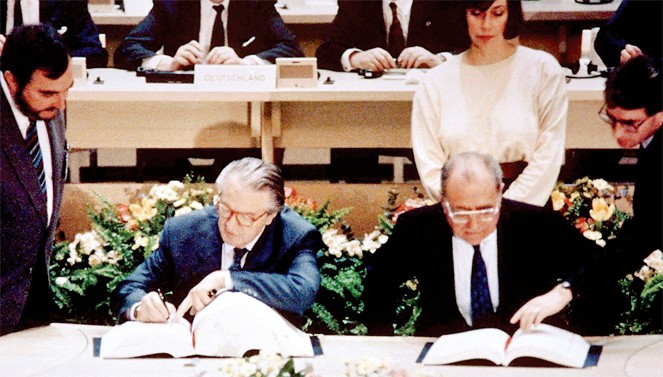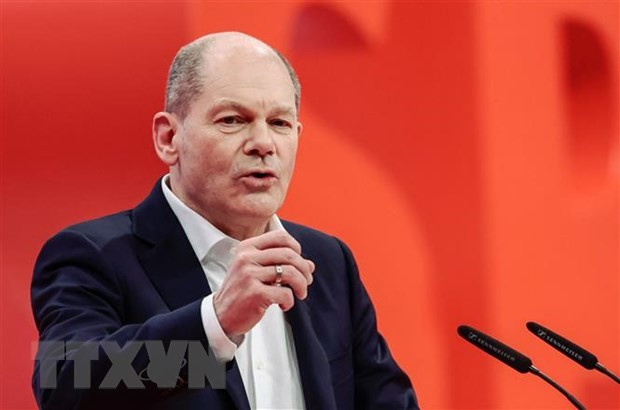(VOVWORLD) - The Maastricht Treaty took effect on November 1, 1993, turning the European community into an economically powerful European Union with global political influence. 30 years later, the bloc is facing a need for comprehensive reform to meet current challenges.
 European ministers sign the Maastricht Treaty. (Photo: Independent) European ministers sign the Maastricht Treaty. (Photo: Independent) |
The Maastricht Treaty, which gave birth to the European Union,was the most important milestone in Europe’s integration. It realized the ambition of many previous generations of European leaders to build, not just a shared market, but a unified economic and political union.
Three decades of radical innovation
Three decades after its birth, the EU has grown in all dimensions. In 1993 it consisted of 12 member states with a gross domestic product of 6.7 trillion USD. Now it has 27 members and last year’s GDP was16.6 trillion USD.
Ambitious projects that the EU proposed three decades ago have mostly been implemented. The dream of a common currency came true in 2002 when the euro was put into circulation, gradually replacing the national currencies of most member countries. The euro is now the official currency of 20 of 27 EU members, which together constitute the Eurozone.
Through difficult times, even near collapse during the public debt crisis from 2009 to 2012, the euro stood firm and is currently the second strongest currency in the world after the US dollar.
The euro boosted intra-bloc trade and turned the EU into the world's leading trading bloc, although there are ongoing complaints that some countries benefit more than others.
Another major milestone in the past three decades was the realization of the concept of European citizenship. More than 400 million citizens of EU countries are now free to move within the EU thanks to the Schengen Agreement that eliminated border barriers between EU countries in 1995. People use a common currency and have the freedom to reside and work in any EU country, thanks to the bloc's judicial reforms. In some EU countries, citizens from other EU member states have the right to vote in local elections where they reside.
The EU's greatest success since the Treaty took effect is probably its geographical and political expansion. It has admitted 15 new members in three decades. Although Brexit shook the bloc in 2016, admission to the EU is still hugely attractive to dozens of countries in Eastern Europe and the Balkans, who have seen what has happened to Eastern European countries who have joined the EU. Poland, for example, has seen its GDP triple since it was admitted to the EU in 2004.
Building a more effective EU
Thanks to great successes over the past three decades, the EU has consolidated its role as a power pole in the world and an exemplary regional model.
But major crises have battered Europe in the past decade, including the public debt crisis of 2009-2012, the refugee crisis in 2015, Brexit in 2016, the COVID-19 pandemic in 2020 and 2021, and most recently the Russia-Ukraine conflict.These crises have pressured EU leaders to consider comprehensive reform of EU treaties to build a new EU with more effective institutions and mechanisms.
One of the most important reforms being discussed is a reform of the EU's decision-making mechanism. Under the terms of the Maastricht Treaty, later adjusted by the 2007 Lisbon Treaty, the EU operates on a consensus basis for major issues like tax, budget, and foreign policy. An individual state can use its veto power to block any decision it doesn’t like. Some countries vetoed the allocation of refugees in 2015 and some have blocked EU aid to Ukraine.
 German Chancellor Olaf Scholz (Photo: AFP/VNA) German Chancellor Olaf Scholz (Photo: AFP/VNA) |
German Chancellor Olaf Scholz said: “Reforms are needed, especially to the bloc's consensus mechanism. I have repeatedly made it clear that using the consensus mechanism to decide issues such as foreign policy or tax policy as before is unacceptable. Majority voting should be used, so that Europe's sovereignty and ability to act is guaranteed.”
Reforming the consensus mechanism and the structure of power distribution among member states in the European Parliament and the European Commission will be major challenges.
Under EU Treaties, the number of seats an EU country has in the European Parliament is based on its population. The European Commission is composed of the College of Commissioners from the 27 EU countries. This structure will be difficult to maintain when the number of EU members increases, because the European Parliament cannot have more than 751 parliamentarians, the maximum number specified in the Lisbon Treaty. It will be difficult for the European Commission to create new Committees for new member states, because it will make the apparatus cumbersome and ineffective.
Experts say it’s time for the EU to reform itself comprehensively to meet the needs of members with a diversity of development levels.